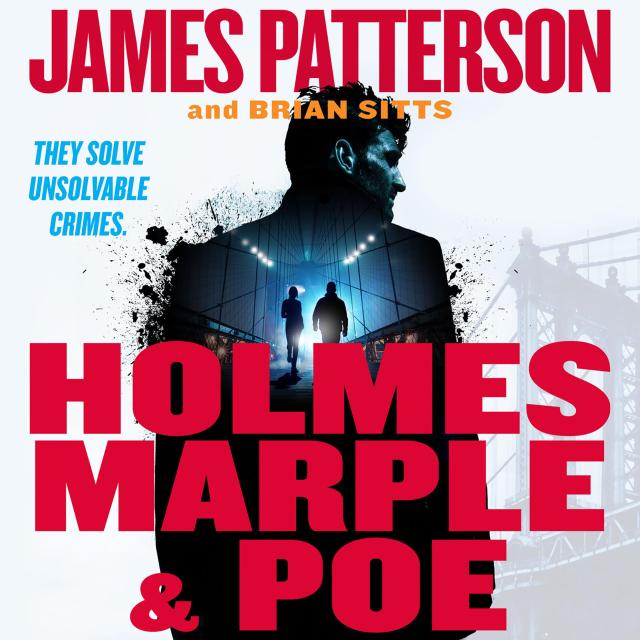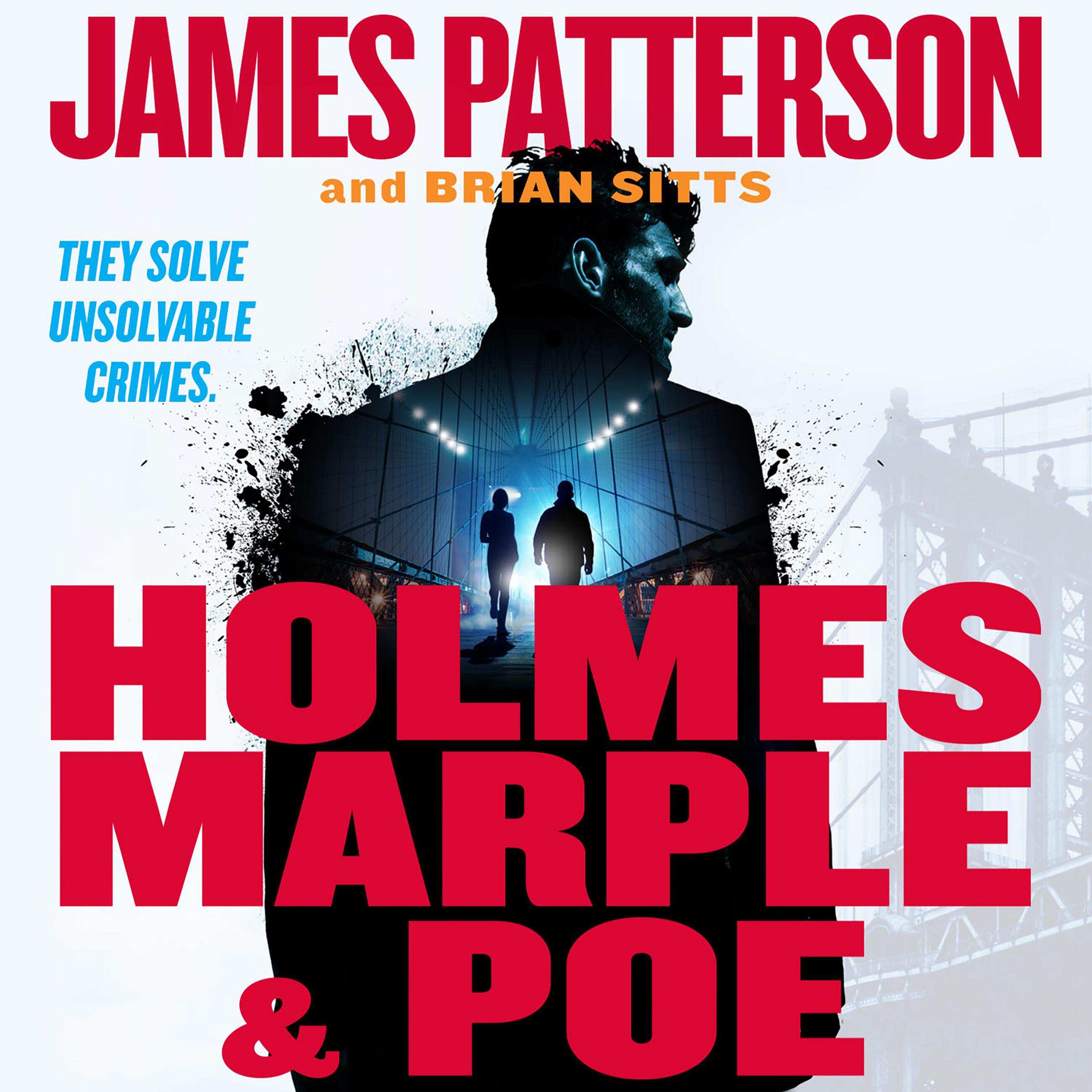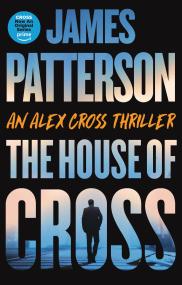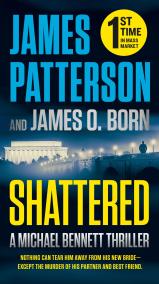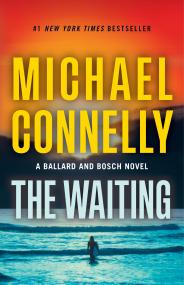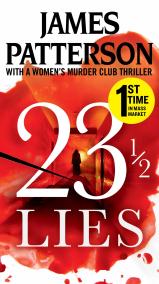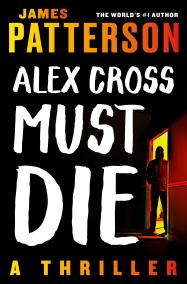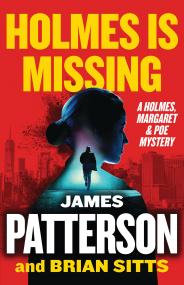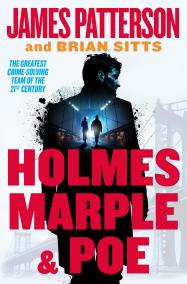Promotion
Use code BESTBOOKS24 for 25% off sitewide + free shipping over $35
By clicking “Accept,” you agree to the use of cookies and similar technologies on your device as set forth in our Cookie Policy and our Privacy Policy. Please note that certain cookies are essential for this website to function properly and do not require user consent to be deployed.
Holmes, Marple & Poe
The Greatest Crime-Solving Team of the Twenty-First Century
Contributors
By Brian Sitts
Read by Christine Lakin
Formats and Prices
Price
$45.00Format
Format:
- Audiobook CD (Unabridged) $45.00
- ebook $14.99
- Hardcover $30.00
- Audiobook Download (Unabridged) $27.99 $99.00 CAD
- Trade Paperback $19.99 $25.99 CAD
- Trade Paperback (Large Print) $32.00
This item is a preorder. Your payment method will be charged immediately, and the product is expected to ship on or around January 8, 2024. This date is subject to change due to shipping delays beyond our control.
Also available from:
In New York City, three intriguing, smart, and stylish private investigators open Holmes, Marple & Poe Investigations. Who are these detectives with famous names and mysterious, untraceable pasts?
Brendan Holmes—The Brain: Identifies suspects via deduction and logic.
Margaret Marple—The Eyes: Possesses powers of observation too often underestimated.
Auguste Poe—The Muscle: Chases down every lead no matter how dangerous or dark.
The agency’s daring methodology and headline-making solves attract the attention of NYPD Detective Helene Grey. Her solo investigation into her three unknowable competitors will delight mystery fans.
Genre:
Series:
-
“In this breezy thriller … Patterson and Sitts have fun playing with reader expectations.”Publishers Weekly
- On Sale
- Jan 8, 2024
- Publisher
- Hachette Audio
- ISBN-13
- 9781668635360
Newsletter Signup
By clicking ‘Sign Up,’ I acknowledge that I have read and agree to Hachette Book Group’s Privacy Policy and Terms of Use
What's Inside
Read Chapters 1 – 12
•••
CHAPTER 1
Last year
THE VACANT INDUSTRIAL space that Realtor Gretchen Wik was trying to unload was located in a recently gentrified Brooklyn neighborhood called Bushwick. The area was becoming trendier by the month, but this particular building was cold and dead—and apparently unsellable.
Gretchen had been sitting at her sales table on the first floor since noon, tapping her nails while she stared out through a grime-coated window. In five hours, she had not been visited by a single prospect.
The property consisted of nine thousand square feet on two levels. But it was run-down and needed a lot of work. At this point, Gretchen felt like the worn wood floors and flaking brick walls were mocking her. She checked her watch. In exactly two minutes, her open house would officially be a bust.
Then she heard the front door open.
“Hello?” A voice from the entry hall. Gretchen’s pulse perked up. She pushed back her chair and walked briskly toward the door, her three-inch heels clicking on the hardwood. She rounded the corner to the entryway.
“It’s you!” said a tall, light-skinned Black man in a camel overcoat. For a second, Gretchen was thrown. Then the man pointed at the folding sign in the foyer, the one with Gretchen’s face plastered on it.
“Right. Yes,” said Gretchen, turning on her best smile. “Positive ID.” She held out her hand. “Gretchen Wik, Lexington Realty.”
“Brendan,” said the visitor, “Holmes.” He had large brown eyes and a neatly shaved head. Gretchen did her routine two-second overview. Coat: expensive, well tailored. Shoes: Alexander McQueen. This guy might be a lookie-loo, but at least he didn’t seem like a total waste of time. And right now, he was the only game in town.
“Welcome to your future,” said Gretchen. She waved her arm toward the open space. Then she heard the door opening again.
“Sorry, have I missed it?” Another male voice.
This time it was a fit, compact man with wavy, dark hair and the kind of thin moustache that can look either silly or sexy, depending on the owner. On him, Gretchen thought it worked—kind of brooding and rakish at the same time. Most important, he was another prospect. The day was looking up.
“You’re in luck,” she said. “Right under the wire.”
“I’m Auguste. Auguste Poe.” Soft voice, with a solemn tone. And the slightest wisp of liquor on his breath.
“I’m Gretchen,” said the agent. She paused for a second as the names registered. Wait. First somebody named Holmes, and now Poe? What were the odds? Or was this some kind of put-on?
Before Gretchen could ask any questions, both men walked ahead of her into the main space. She caught up and launched into her spiel—the same one she’d been practicing at her lonely table all morning.
“Gentlemen, you’re looking at the very best bargain in Bushwick. Late nineteenth century construction, slate roof, terra cotta details, original skylights . . .”
“Pardon me? Anybody home?” The door again. A female voice this time, with a charming British accent.
Gretchen switched on her greeting smile again, getting even more excited. Two minutes ago, she had zero prospects.
Now, suddenly, she had three.
•••
CHAPTER 2
“AM I TOO late?” the woman asked.
“Not at all,” said the Realtor. “I’m Gretchen.” “I’m Margaret Marple.”
Hold on, thought Gretchen. Holmes. Poe. And now Marple??
She registered a quick impression of the new arrival: Attractive, but not flashy. Minimal makeup. Tweed skirt with an inexpensive top. The accent was refined. The look was practical.
“I have to ask,” said Gretchen. “Your names . . .”
“Tell me something,” said Holmes, ignoring the impending question. He was picking a piece of loose mortar from a brick wall. “Why is it still on the market?”
Gretchen cleared her throat. “I’m sorry, what?” Never mind the names. She had some selling to do.
“Your price per square foot dropped from six forty-five to five ninety in two weeks,” said Holmes. “So I’m just wondering . . .” He stopped mid-sentence and wrinkled his nose. “What is that smell?”
Gretchen realized that she was now playing defense. “Well, the building used to be a bakery,” she said. “Maybe it’s . . . ?”
“No,” Holmes said firmly, moving toward the other side of the room. “This is recent—and quite caustic.”
When he reached the large factory window on one wall of the space, he pushed the bottom half open and leaned out. “There was a tattoo parlor next door,” he said. It was a statement, not a question. Poe and Marple walked over to join Holmes at the window.
Gretchen was familiar with the view, and it wasn’t great. Her prospects were looking at the neighboring building, a one-story wreck with a corrugated door sealing the front. Plastic bins and trash littered a small paved area at the rear.
“I can check the property records,” said Gretchen, trying to glide past the unsavory subject. “I know it’s unoccupied at the moment.”
“PAHs,” said Holmes. “Pardon?” said Gretchen.
“Polycyclic aromatic hydrocarbons. Used in black inks. They have a bit of a car-tire taint.”
“Funny,” said Gretchen. “I don’t smell a thing.”
“I’m hyperosmic,” said Holmes. “Blessing and a curse.”
Gretchen realized that she was quickly losing control of the tour. “Sorry, I don’t—”
“Unnaturally acute sense of smell,” said Holmes. “A genetic fluke.” “Maybe we should check out the second floor?” Gretchen hinted, pointing toward a rusted metal staircase.
Poe gestured graciously. “Ladies first.” Gretchen took the lead, praying that the corroded treads would support the weight of four people. The second floor was as wide-open and empty as the first, except for a scattering of abandoned office furniture. “Take your time,” said Gretchen. “Any questions, just ask.”
As Marple ran a finger across a dusty bookshelf, Holmes dipped to one knee and scratched a floor plank with his fingernail. “Low-grade pine,” he mumbled. He pulled a small metal ball from his pocket, placed it on the floor, and watched it roll lazily toward the wall. “Two-point-five-centimeter slope,” he added with a frown.
Gretchen was trying to decide which of the three she should focus on. Holmes was clearly a fastidious nitpicker, maybe even obsessive. Marple seemed quiet and thoughtful. Poe was harder to read. Gretchen studied his face as he pulled open the top drawer of a creaking metal office filing cabinet and peeked in. He hadn’t smiled once since he arrived, but there was something darkly magnetic about him.
“Just so I’m clear,” Gretchen asked, realizing her three prospects might be shopping together, “are all of you . . . ?”
“My God!” Poe exclaimed. “Murder!”
Gretchen froze as Poe pulled a yellowed newspaper clipping out of a file. His expression turned even more dour. “Someone was killed here,” he said.
“What?” said Holmes, suddenly energized. “Really?” said Marple.
Poe waved the clipping. “Take a look.”
He smoothed the scrap of newsprint on top of the file. Gretchen’s gut was churning. The seller had warned her about this grim historical factoid. Dammit! She should have checked the drawers before the showing.
Marple ran her finger down the article and turned to Gretchen. “So it’s true?”
Gretchen cleared her throat. “I’d heard rumors,” she said carefully, “but—”
“Not a rumor,” snapped Holmes. “It’s right here in black and white.”
Gretchen stepped closer and looked over Poe’s shoulder. The paper was brittle, but the type was clear. DEATH IN A BAKERY, the headline read. And underneath, “Young Girl Slain Before Dawn.” The one-column story was accompanied by a photograph of a building.
The building they were in.
“Her throat was slit,” said Poe. “On the floor right below us. In 1954. She was just nineteen.”
Marple winced. “That poor child.”
Gretchen pictured her commission evaporating before her eyes. She did a quick mental calculation, ready to cut the price on the spot. Who the hell would pay almost six hundred dollars per square foot for a murder site?
Before she could float a new number, all three of her prospects turned and spoke at once.
“We’ll take it!”
•••
CHAPTER 3
Present day
AUGUSTE POE WAS anxious to get moving. A teacher had once described him as having an excitable temperament, and it was showing this morning.
As he exited the newly renovated bakery building in a crisp linen suit, Poe glanced at the fresh lettering on the front door. Gold leaf in a classic font. It looked expensive and exclusive. Holmes, Marple & Poe Investigations finally felt legit, and today was the day that would put them on the map. Poe was sure of it. They had the right case. They had the right skills. They just needed to execute flawlessly—as a team.
As he waited impatiently for his two partners, Poe walked to the bakery’s former loading bay and wiped a speck of dust off the hood of his newly acquired 1966 Pontiac GTO. Montero Red. Tri-Power upgrade. XS Ram Air package. He’d paid fifty thousand to a Newark collector and considered it a steal. Poe was obsessive about anything mechanical, and muscle cars were a particular weakness. Despite outrageous Brooklyn garage fees, he owned an impressive collection, rotating his rides according to his mood.
“Good God, Auguste, what is that monstrosity?”
Margaret Marple was standing outside the office door in a neat business jacket and skirt, staring at the Pontiac.
“It rides as smooth as a town car,” Poe said, knowing she preferred more discreet transportation. “I promise you.”
Marple frowned. “I’ll wrinkle my outfit, folding myself into that thing.”
“Margaret, you need to be more flexible,” said Brendan Holmes, exiting the door right behind her. He plucked a speck of lint from his suit jacket as he walked toward the car.
“Let’s go!” Poe said as he slid in behind the steering wheel.
The powerful Pontiac was no advantage on the trip to One Police Plaza. The crosstown drive through Brooklyn was torturous, with a lot of stop-and-go on the way. Poe could feel his partners’ nerves too. Their plan hinged on getting in front of Police Commissioner Jock Boolin. And Boolin was a notoriously hard man to corner.
The commissioner was new to his post, recently appointed by New York City mayor Felix Rollins after a long career in Chicago. This would be their first in-person encounter. By all accounts, Boolin was a hard-nosed cop and a savvy political operator. Poe and his partners had done their due diligence. Now it was time for a critical face-to-face.
The topic they wanted to discuss was a case that was consuming the city: the mysterious disappearance of a young Black attorney named Sloane Stone.
Sloane’s impressive résumé ticked through Poe’s mind as he drove. Brooklyn girl made good. Harvard undergraduate. Yale Law. Junior associate at a top New York law firm. Brilliant and beautiful. The profile picture on her law-firm website showed Sloane Stone to be a young woman with bright eyes, a huge smile, and dark hair worn full and natural, with a few tight curls falling across her forehead. Missing for two weeks now without a trace. The pressure on NYPD—and the new commissioner in particular—was growing more intense by the day.
The new firm had gotten an anonymous tip, and what they’d learned was about to shake up the whole city. Poe glanced in the rearview mirror as Marple pulled up the latest reports on her iPhone.
“Any breakthroughs?” asked Poe.
“The authorities are still baffled,” said Marple. “Good,” said Holmes. “We’re not.”
As Poe headed for the Brooklyn Bridge crossing into Manhattan, he got a fresh tingle of anticipation. This was it—their first high-profile case—and he and his partners were determined to break it wide open.
Even if nobody had actually hired them.
•••
CHAPTER 4
WHEN THE THREE investigators arrived on the top floor of One Police Plaza, Poe led the way to the commissioner’s suite, where a late-twentysomething receptionist sat behind a huge oak desk. He glanced at the assistant’s nameplate as he stepped forward, then cleared his throat and adjusted his voice to a tone of warm familiarity, as if he had known her forever.
“Samantha,” he said. “Good morning. How are you? We need to see the commissioner—immediately.”
“Who does?” the receptionist shot back. In just two words, Poe detected the distinctive inflection of a Queens native. He looked closer. Samantha’s wardrobe and jewelry conveyed a tone of edgy self-assurance, and her manicured nails looked as sharp as daggers. Poe immediately realized that she was no pushover.
“Holmes, Marple, and Poe Investigations,” he said. He flicked a business card from his wallet with the flair of an illusionist.
Samantha took it.
“Holmes, Marple, and Poe?” she said. “Is that a joke?”
Holmes leaned over the desk. “We’re private investigators. And we have important information for the commissioner. Critical information.”
Samantha shifted her cold stare in his direction. “Do you have an appointment?”
Marple stepped forward. “We have intelligence on the disappearance of Sloane Stone,” she said softly. “It involves the mayor.”
Samantha tilted her head. “Sloane Stone?” Poe noticed a sudden uptick of interest. The receptionist lowered her head and tapped her touchscreen. Poe could hear her speaking tersely into her headset.
About thirty seconds later, a blond-haired woman in a dark suit walked into the reception area. She was tall and elegant. Also, Poe gathered from her body language, stern and efficient.
“I understand you have information concerning the mayor,” she said.
Poe nodded and handed her a business card. “Holmes, Marple, and Poe Investigations. Are you from the mayor’s office?”
“I’m Kristin Rove, special assistant to Mayor Rollins. Anything you have for the mayor, you can tell me.”
“Not this, I’m afraid,” said Poe.
“For the commissioner’s ears only at this point,” Marple added politely.
“Well, let me tell you how it works,” Kristin said, shifting her eyes from Marple to Holmes to Poe. “You don’t see the commissioner without going through Samantha, and you don’t see the mayor without going through me.” She glanced down at the business card. “So unless you’ve actually found Ms. Stone, you’ve come all the way from Brooklyn for nothing.” She handed the card back to Poe, then walked off.
Poe turned to Marple and nodded toward the reception desk. “You try.” It was time for a tag-team approach. Maybe Marple’s people skills would be more productive.
Poe knew that in addition to being a natural snoop, his partner was an intuitive student of human psychology. He stood back with Holmes and watched as Marple walked up to Samantha’s station and rested a hand on the polished oak top. The receptionist was clearly doing her best to ignore Marple’s presence, but she eventually looked up. “Can I help you?”
“About your age. Am I right?” said Marple. “Who?” asked Samantha.
“Sloane Stone.”
Samantha shifted awkwardly in her seat. “I guess.” A long pause. “But I went to Queensborough Community and she went to a fancy Ivy, so I think Sloane and I are sort of on different levels.”
“Were.”
“What?”
“Were. Past tense. One of you is dead.” Samantha blinked. “You don’t know that!”
“Actually, we do,” said Marple. “We’re very good at our job. That’s why we’re here.” She lowered her voice to a confidential whisper. “The truth is, Samantha, we know more about the different kinds of human wickedness than anyone you’ve ever met.”
The receptionist stared at Marple for a second. Then she pulled off her headset, got up from her chair, and walked through a thick door behind the reception area. Success! Poe and Holmes stepped forward, poised and ready. A few seconds later, Samantha was back. She sat down and picked up her headset again.
“Sorry.” She shrugged. “Commissioner Boolin has left for the day.
He must have used his private exit.”
Poe glanced at his partners. “Not a problem,” he said. “We know where he lives.”
•••
CHAPTER 5
HEADING NORTH ON the West Side Highway, the GTO’s 380-horsepower engine growled as Poe speed-shifted through traffic. Once they passed Riverside Park, he opened it up further.
“Think he’ll beat us home?” asked Holmes. “Only if he took the chopper,” said Poe.
The GPS had estimated a thirty-four-minute drive to Riverdale. It took twenty. Poe slowed the car to a crawl as they entered the narrow, tree-lined roads of the exclusive Fieldston enclave. The stately homes were set on natural hills and tucked away in cozy hollows. It was like a charming forest village, where low-end properties went for about two million. Poe drove slowly up Goodridge Avenue.
“I think your car might stand out a bit in this neighborhood,” said Marple.
Poe looked around. Marple was right. The curved driveways were dotted with Mercedes, BMWs, and Teslas. He parked the flashy red Pontiac in a shady spot across from the entrance to Boolin’s secluded estate, then climbed out of the car. Holmes and Marple followed. They took positions in a grove of fir trees near the stone pillars at the end of the driveway.
Just two minutes later, a black Suburban rolled up the street and pulled to a gentle stop. The rear door opened. Police Commissioner Boolin stepped out. He was tall and imposing, with wavy silver hair. Poe watched from behind a thick trunk as Boolin waved to his driver, who executed a skillful K-turn and drove off.
The commissioner walked to his mailbox and pulled out a small stack of envelopes and magazines, then started up the driveway, flipping through the mail as he went. Poe glanced at his partners and gave the signal. All at once, they stepped out from behind cover. Boolin looked up, startled.
“Anything interesting in the mail?” asked Holmes. “Or just the usual bribes?”
Boolin’s expression darkened as the three PIs approached. “What are you doing here? I told my girl to get rid of you.”
“Don’t blame Samantha,” said Holmes. “She did her best.” He pulled out a business card. “Holmes, Marple, and Poe Investigations,” he said. “When we said we needed to talk to you, we meant it.”
Boolin ignored the card. “Why are you skulking around in my woods?” he said, thrusting his square chin forward.
Poe stepped up. “Commissioner,” he said, “the information we have concerns Sloane Stone.”
Boolin waved dismissively. “Right. You and everybody else in town.” He started back up the driveway. “If you’ve got a lead, call the hotline. Or make an appointment through channels, like professionals—instead of a pack of goddamn stalkers.”
Poe glanced at Holmes. This was the moment.
“We know she was murdered,” Holmes called out. “And we know where she’s buried.”
Boolin stopped and turned around slowly. He took a few steps back down the driveway and looked from Holmes to Marple to Poe. “And how the hell do you know that?”
“When you have eliminated the impossible,” said Holmes, “whatever remains, however improbable, must be the truth.”
Boolin’s eyes narrowed. “That sounds like gobbledygook,” he said. “But sure. I’ll call your bluff.” He folded his thick arms across his chest. “Where is she?”
•••
CHAPTER 6
THREE HOURS LATER, Holmes stood with Marple and Poe at the entrance to an abandoned farm about a hundred miles north of New York City. He looked around at the small caravan of police vehicles that had escorted them. Boolin hadn’t been ready to call out a full search team on the say-so of three unfamiliar PIs. But he’d agreed to send a couple of rookies and one homicide detective for a preliminary scout.
Holmes could feel his heart racing. The partners had agreed that he would take the lead on this case, but at the moment, he was way out of his comfort zone.
As soon as they’d arrived, the odors of fertilizer and manure had overwhelmed him. They were staggering, almost intolerable, clouding his olfactory sense just when he really needed it. He leaned back against a fence post and pressed his hands against his temples, breathing through his mouth. His superior sense of smell made him part bloodhound, part pointer, and part bulldog. But sometimes, it just made him sick.
He felt Poe’s hand on his shoulder. “Brendan, are you okay?”
Holmes nodded. “I just need a few minutes to adjust to the redolence.”
“What’s happening?” asked Marple. “He’s recalibrating his nostrils,” said Poe.
“Not a fan of country air?” asked Detective Lieutenant Helene Grey.
Holmes could tell that she thought this was a waste of time, and he sensed that she was going out of her way to needle him.
Grey was a newcomer to the squad. Holmes estimated her age at thirty-eight, give or take a year. From quick observation, he determined that she was a natural blonde, with just a little salon assist. Normally, he would have been able to detect the level of ethanolamine in her hair dye. But not today. Too much olfactory competition.
“I much prefer the urban miasma,” said Holmes.
Grey cocked her head. “Tell me something, Mr. Holmes. How can you be so sure about the location of Sloane Stone’s body—unless you had something to do with hiding it?”
Holmes ignored the jab and stalled for time, waiting for his overactive senses to settle. He glanced around the property, from the barnyard to the fence line in the distance.
“If you want to dispose of a body on a farm,” he said, “you have several options. You can feed it to the pigs, but they leave hair and teeth behind, so it’s an incomplete solution. You can bury the body in the middle of a field, but eventually a plow or some woodland creature will dig it up. You can drop a body in a grain silo, but you’d have to lug the dead weight up the stairs and hope that you don’t tumble in yourself and suffocate under the grain.”
Grey stood with her arms crossed, drumming her fingers. “Put up or shut up, Mr. Holmes,” she said. “Do you know where the body is or not?”
Holmes paused and took a deep breath. His delaying speech had worked. Olfactory adaptation was setting in, desensitizing him to nearby smells. In their place, he began to detect telltale molecules of cadaverine, putrescine, indole, and skatole. Faint and distant, but unmistakable.
The scent of decomposing flesh.
Holmes looked past the barn toward the uncultivated field behind it. “Follow me.”
The team walked single file across the muddy furrows, Holmes first, then Grey, then the two cops, then Poe, then Marple—the only one in the posse wearing knee-high Wellington boots.
As he walked, Holmes felt all the ancillary scents disappear. It was like wiping a film of vapor from a pair of glasses. Now everything was clear. Painfully clear. His stomach started to turn as he homed in on the odor of death, and it triggered a curious sense of loss. He’d never met Sloane Stone, but he knew things about her that nobody else did. Not even his partners.
At the edge of the field was a mound of compost, five feet high and stretching twenty yards along the perimeter of the property. Holmes walked slowly down the row as the others trailed behind him. About ten feet from the end of the mound, he stopped and pointed.
“She’s right here,” he said.
Grey glanced at Marple. “Is he sane?” “Not always,” said Marple.
“But he’s usually right,” added Poe.
Grey turned to the two cops. “Tape it off, guys.” Then she pulled out her phone and placed the call to CSU.
•••
CHAPTER 7
MARPLE WATCHED TWO white Crime Scene Unit vans roll to a stop near the barn. Stone-faced and anxious, she stood with Holmes and Poe as Detective Grey briefed the technicians, dressed in white overalls with matching hoods and booties. As the techs gathered their tools, the detective walked over with three extra respirator masks. “If Holmes is right,” she said, “you’ll want these.”
Marple strapped the mask around her face and heard the strange sound of her own breathing from behind the mouthpiece. She hesitated for a few moments while the rest of the team headed across the field.
As much as she trusted her partner’s skills, Marple held out a small hope that he was wrong, at least in this case. She preferred to imagine Sloane Stone on a sunny beach with a huge margarita, laughing at the thought of men in hazmat suits trying to dig up her bones in a bean field.
“Margaret! You coming?” Poe’s voice was muddled by his mask. Marple waved back and followed the worn path through the furrows. The CSU team set up a series of metal screens over huge trays.
They used small spades, not much bigger than beach toys. Working slowly and deliberately, they scooped small mounds of compost onto the screens and spread it with their gloves and tools. But just a few minutes into the dig, the detailed archeology became moot.
“Christ!” shouted one of the techs, stepping back. A human arm, or what was left of it, protruded from the pile.
Marple turned away for a moment, then forced herself to look. It was part of the job. For her, it was the hardest part—the part where all hope was gone.
The extraction took thirty minutes, and the result was pure horror. The once beautiful young woman was now barely a coherent shape. Only the hair on her scalp still had some semblance of who she had been. Though matted with dirt and refuse, it retained a hint of how it had looked in her official law-firm profile photo.
New pictures were being taken now, detailed and devastating, from every possible angle. Inside her mask, Marple murmured a silent prayer as the team unzipped a body bag and gently enclosed inside it the mortal remains of Sloane Stone. Two of the CSU guys then carefully transported the bag back across the field toward the vans. A second team stayed behind to sift for more evidence.
Grey, Holmes, and Poe walked a few yards away from the scene and yanked off their masks. Marple removed hers too and caught up with them. She could hear Holmes expounding again.
“Don’t be surprised if the hyoid bone is intact,” said Holmes. “That doesn’t mean she wasn’t strangled. She was. I believe that the act took some time. Perhaps because the killer had small hands.”
“Well, let’s see what the autopsy turns up,” said Grey. “That might narrow down our suspect list.” She looked pointedly at Holmes. “Let’s hope it excludes you.”
It was clear to Marple that Grey was into procedure and process, and that she was eager to get the case back onto a normal track, firmly under her control. But Marple could tell that, as usual, Holmes had a plan of his own.
•••
CHAPTER 8
AT NINE O’CLOCK sharp the next morning, Holmes and his partners arrived at Gracie Mansion, the official residence of Mayor Felix Rollins. Detective Grey pulled up behind them in an unmarked sedan, then led the way inside.
At a security screening station, the three PIs surrendered their handguns. Grey waved her badge and got a pass for hers.
The Upper East Side mansion was humming, and Holmes noticed that the corridors and cubicles were mostly filled with attractive young women—including the statuesque assistant who walked them to the first-floor parlor.
“The mayor will be with you shortly,” she said, showing them into the room.
As he crossed the threshold, Holmes felt as if he’d stepped back into the eighteenth century. Colonial-era furniture. Thick draperies. Crystal chandeliers. Ornate vases filled with white flowers. A mildly fruity aroma filled his nostrils.
“Panicle hydrangea,” said Marple, brushing one of the petals. “Lovely.” Poe ran his hands admiringly over an antique bowfront sideboard.
“Remember,” Grey said firmly, “we’re here to update the mayor on the investigation. Nothing more. You’re here as a courtesy.”
“And because we located the body,” said Holmes. “We still have to solve the crime,” said Grey.
“Crime is common. Logic is rare,” Holmes muttered. “Therefore it is upon the logic rather than the crime that you should dwell.”
“What the hell does that mean?” asked Grey.
“It means you should read more Arthur Conan Doyle,” said Holmes. “In fact, his work should be taught at the academy.”
At that moment, the mayor appeared in the doorway. Holmes was not surprised to see him flanked by his assistant, Kristin Rove. From what he’d learned, Rollins rarely went anywhere without her.
Holmes took a quick inventory of the mayor. It was the first time he’d seen him in person. Large head. Dark eyes. Slight, almost delicate physique, interrupted by a pronounced belly.
“Why are we here?” asked Rollins. Brusque and arrogant. “You said you’ve got something new on Stone?”
Grey stepped forward, but Holmes stepped right in front of her. “That’s true, we do,” said Holmes.
“Who the hell are you?” Rollins asked.
“He’s a PI,” replied Kristin. She’d said “PI” as if it were a venereal disease.
“My name is Holmes.” Rollins gave him a weak, noncommittal shake. Holmes noted his small, soft hands. “And these are my associates, Ms. Marple and Mr. Poe.”
Grey stepped up again, nudging Holmes aside. “Sorry, Mr. Mayor.”
Rollins glared at her. “Let’s hear it, Grey. Have you got something new on Stone or not?”
“As of yesterday, Mr. Mayor,” she said, “it’s a murder investigation.” “You have a body?” asked Kristin.
Grey nodded. “Sadly, we do.”
“At least that’s progress,” Rollins replied evenly. “What about suspects?”
Holmes inched closer to the mayor, deliberately violating his personal space. “As a matter of fact,” he said, “we’re looking at somebody right now.” He was being obnoxious and invasive—and he knew it.
It was one of his favorite techniques for rattling his prey.
•••
CHAPTER 9
“HOLMES! WHAT ARE you doing?” Grey grabbed him by the shoulders.
Rollins took a step back. “Hold on. Are you saying I’m . . . ?”
“No, we’re not!” said Grey.
“Or are we?” said Holmes.
Grey looked exasperated. “Mr. Mayor, I apologize. We’re only here to—”
Rollins put his hand up. “Shut up. I’d like to hear this.” He stared directly at Holmes. “You have something to say about me?” He glanced at his Rolex and perched himself on the arm of one of the parlor’s antique chairs. “You have two minutes. Before I have you thrown out. Or arrested.”
Holmes glanced at his partners, then walked to the fireplace and rested his arm on the marble mantel, calm and unhurried. Inside, he felt fully alive and totally focused. He lived for moments like this. Moments when he was in total control.
“Mr. Mayor, when you prefer not to bother with a security detail, you have a personal car at your disposal. Is that right?”
Rollins shrugged. “You mean do I sometimes go under the radar for some private time? Absolutely. My car, my business.”
“The Audi S8,” said Holmes.
Rollins turned toward Grey. “Is somebody tailing me? Did you put a tracker on my car?”
“Absolutely not, Mr. Mayor,” said Grey. “We’d have no reason to do that.”
Holmes pressed on. “Not NYPD, sir. It was somebody on your staff. For security purposes, ostensibly. But I’m sure you’re aware, there are many additional ways to deduce a vehicle’s travels. Tire prints. Fender well residue. Soil matches. Specifically, silt loam with a pH of 6.5 and traces of Phaseolus vulgaris.”
Rollins was clearly losing patience. “What are you talking about?” “Bean leaves,” said Holmes. “Mr. Mayor, do you have any reason to visit Dutchess County?”
“Dutchess County?” said Rollins. “I don’t go upstate unless I’m meeting with the governor. I haven’t been north of Harlem for three months. Kristin can confirm that.”
“Your Audi has,” said Holmes. “Been north. To Amenia, New York.”
“Amenia?” Rollins looked perplexed.
“Rural town,” said Holmes. “Conveniently remote.”
“Mr. Mayor,” said Detective Grey, “Sloane Stone’s body was found on a farm near Amenia yesterday afternoon.”
“The same location your car visited. Approximately two weeks ago,” said Holmes. “Based on tracking. Confirmed by the degree of decay in the vegetation traces in your wheel-well liners.”
“This is bullshit!” said Rollins.
Holmes walked back toward Rollins and recited a Gmail address. “What’s that?” Rollins said gruffly.
“Sloane Stone’s personal email address.” “So . . . ?”
Holmes glanced up and to the side, as if pulling data out of the air. “There have been, as I recall . . . twelve messages from your personal email.”
“Pure crap,” said Rollins. “I never sent any messages to Sloane Stone. I didn’t even—”
“Here’s one right here,” Holmes interrupted, holding his cell phone in front of Rollins’s face.
“Enough!” Rollins pushed the phone away and glared around the room. “Listen to me. All of you. I met Sloane Stone once, a year ago, at some legal event.”
“Correct,” said Holmes. “The Legal Aid Society Benefit. Last May 11th.”
“That’s right,” said Rollins. “I recognized her picture from the news when she went missing. Attractive girl. I talked to her for two minutes at the party. Never saw her again. Never sent her any emails. Never.”
Holmes let out a small sigh. “I’m not sure you can prove that, Mr. Mayor.” He paused and let the silence sink in. “But your assistant can.” He turned toward Kristin. “Am I right, Ms. Rove?” Kristin stiffened. Her composure faded.
Holmes flicked a glance at Marple and Poe. Both were wide-eyed with surprise, as he knew they would be. He felt Grey’s hand on his arm. “Holmes! What are you doing?”
“Revealing the truth,” said Holmes. “Painful as it may be.” Kristin turned toward the doorway behind her. “Security!”
In two seconds, a plainclothes officer stepped through the doorway. Kristin moved quickly to his side. “I need these people removed,” she said. “Now!”
“Kristin, calm down,” said the mayor. “What are you worried about?”
Kristin whipped her hand inside the officer’s jacket and pulled out his handgun.
She took two quick steps back and pointed the weapon at his chest. “On the ground!”
The officer dropped to his knees.
Holmes stepped back to shield his partners. He’d been expecting a reaction, but not this one. As he watched, Kristin whipped the gun toward Detective Grey, who was reaching behind her back. “Go ahead,” said Kristin. “Pull it out slowly. And then put it on the floor.” “Hold on,” said Grey, moving her hands out to her sides. “Let’s talk.”
“Do it!” shouted Kristin. Grey slipped her gun out of her holster and laid it gently on the carpet. Kristin walked over and kicked the butt of the gun, sending it spinning into a corner. Rollins took a step toward Kristin and grabbed her arm. “What the hell are you doing?”
Kristin twisted away and pressed the gun against the mayor’s forehead. “Don’t fucking touch me!” she said. “Ever again.”
Rollins rocked backward. “Kristin, have you gone crazy?”
“She’s not crazy, Mr. Mayor,” Holmes said calmly. “She’s cold and crafty. One of the best I’ve ever seen. She killed Sloane Stone and almost managed to pin it on you.”
Rollins stared at his assistant with a stunned expression.
“Do you want to hear the evidence now, Ms. Rove?” said Holmes. “I can lay it out right here. Or should we wait for your written statement?” He paused. “Or do you plan to kill us all too?”
“Back off!” Kristin shouted. “Everybody just—back off!” She swiveled the pistol back and forth, arm extended, and started moving toward the door. The instant she cleared the opening, she turned and dashed out a rear exit and down a set of stairs.
Out of the corner of his eye, Holmes saw a figure bolt after her. It was Marple.
•••
CHAPTER 10
MARPLE LEAPED DOWN the stone steps three at a time and kicked off her shoes at the bottom. She took off at a sprint, heading across the property and down toward the curved walkway that bordered the East River. She could see Kristin in the distance, about twenty yards ahead, near the far edge of the mansion grounds.
It was obvious that Kristin had shed her shoes too. Nobody could move that fast in heels. But Marple was closing in on her. She was glad she’d chosen wide-legged trousers that morning. Kristin was younger, and had longer legs, but Marple could tell that her tight skirt was cramping her stride. The gun was still in her hand.
In seconds, Marple was on the paved pathway, with the river on her right.
She saw Kristin turn to look over her shoulder. Marple gained a few steps. Now she was just ten yards back. When Kristin turned forward again, a kid on a bike almost knocked into her. She tipped to the left, rocking on one foot. Marple closed the gap. She wrapped her arms around Kristin’s shoulders and drove her to the pavement as the gun clattered away.
“Get the hell off me!” shrieked Kristin. “I’ll sue your ass!”
As the furious woman squirmed and twisted beneath her, Marple heard footsteps coming up from behind.
“Freeze!” Grey’s voice.
Marple saw Grey’s gun barrel pressing against Kristin’s scalp. The plainclothes officer was pinning her legs.
“Okay, Kristin,” Grey said between breaths, “let’s talk about Sloane Stone.”
“You can’t prove anything!” shouted the mayor’s assistant.
“You just threatened the mayor, NYPD officers, and a roomful of civilians with a stolen gun, Kristin. Then you ran. That’s both criminal possession of a firearm and consciousness of guilt. We’ll start there.”
Marple eased herself off Kristin’s back and sat on the walkway, panting hard as Grey cuffed Kristin and led her away. The other officer squatted down at Marple’s side.
“You okay?” he asked. “That was a mean tackle.”
“I’m fine,” said Marple, brushing dirt off her slacks. “Murder brings out the bitch in me.”
•••
CHAPTER 11
HOLMES HITCHED A ride in a squad car back to Bushwick—alone. Marple and Poe had left without him. Not a surprise. He had fully expected that his partners would be furious with him for keeping them in the dark about the real killer. And deep down, he knew they had every right to be. On their first major case, he had blindsided them.
Maybe it was all those years working on his own that made him so independent. Maybe, like the original Holmes, he considered himself the last and highest court of appeal in detection. Maybe he was self-destructive. Or maybe he just craved the drama.
When he walked into the office, Poe and Marple were sitting at a table in the common area, waiting for him. Poe spoke first.
“What the hell, Brendan!”
“That was completely irresponsible,” said Marple. “Your big reveal could have gotten us all shot.”
“Well, nobody told you to run off in hot pursuit,” said Holmes. “That was dangerous.”
“I had no choice,” said Marple. “When I see a fox, I turn into a hound.”
“Look,” said Holmes, taking a seat at the table. “It was my case. My lead.”
“True,” said Poe, “but that didn’t give you the right to hold out on us on our first major case. We’re partners.Remember?”
“Misdirection,” said Holmes. “It’s one of my gifts.”
Poe’s expression darkened. “Well, you don’t get to misdirect us!” “The truth is,” said Holmes, “I was misdirected myself until yesterday. Everything pointed directly to the mayor. The evidence supported it. The car. The tire prints. The emails.”
“The location of the body,” added Poe.
Holmes nodded. “Everybody knows about the mayor’s fondness for young women. It was logical to deduce that he and Sloane had an affair. That she might have become a liability, or an embarrassment, or threatened blackmail. So he killed her and disposed of her body. Classic story. But, as we all know, there is nothing more deceptive than an obvious fact.”
Marple leaned forward. “You’re saying Rollins and Sloane weren’t having an affair—”
“Correct,” said Holmes. “Kristin and Sloane were. And it ended badly.”
“According to whom?” asked Poe. “According to Samantha.”
“The commissioner’s assistant?” said Marple.
Holmes nodded. “I could see that Samantha was rattled by our visit. So last night I went to see her in Queens. She and Kristin used to both work in the commissioner’s office, before Kristin got promoted. Samantha knew all about Kristin’s romance with Sloane. They were keeping it a secret because Kristin didn’t think a same-sex relationship would go over well in the mayor’s office.”
“Rollins clearly prefers mayor-on-girl,” said Poe.
“There was an ugly breakup,” said Holmes. “This was a few days before she disappeared. Apparently, Sloane wanted to see other people. Men, specifically. That’s all Samantha knew. Until we walked in.”
Poe leaned back. “So when Kristin realized she couldn’t have Sloane to herself . . .”
“They fought,” said Marple, picking up the thread, “and she killed her—with her bare hands.”
“Her bare, small hands,” said Poe. “Just like the mayor’s.”
“From what Kristin told Samantha,” said Holmes, “Rollins has been pawing her in the office from the day she started.”
Poe shifted in his chair. “Which is why she set him up to take the fall.”
Holmes nodded. “Kristin put a tracker in the mayor’s private car. Used the car to drive Sloane’s body to the country. Then planted the emails to Sloane from the mayor’s account. She had everything she needed to point the finger at her grabby boss. All that was missing was somebody to find the body. So when NYPD dropped the ball, she left us an anonymous tip.”
“Thinking we’d stop at the obvious suspect,” said Poe. “Which we almost did,” said Holmes.
“That still doesn’t excuse your keeping secrets from us,” said Marple. “We’re partners, not rogue operators.”
Holmes could tell she was angry, embarrassed, and hurt. “For the record,” he said, “the firm solved the crime. Holmes, Marple, and Poe Investigations. We did it. And we’ll all reap the rewards.” Holmes reached into his pocket and pulled out a small key. “In the meantime, I’m afraid there’s something else I’ve been keeping from you.”
He reached over and unlocked a cabinet next to the table. He pulled out a bottle of wine. A 1992 Screaming Eagle Cabernet. He’d paid twenty-five hundred dollars for it on the black market, and he’d been saving it for a special occasion. Right now, he hoped it might help him get back in his partners’ good graces.
“Is that what I think it is?” asked Poe, eyes wide.
“Looks are not always deceiving, Auguste,” said Holmes. He set the bottle on the table and reached for three large wine goblets. He pulled the cork and poured.
Marple swirled the wine and sniffed. “You know I prefer sherry,” she said. Then her expression softened. “But this bouquet is heaven.”
“I propose a toast,” said Holmes. “To Holmes, Marple, and Poe.” “To teamwork,” said Poe.
“To no more secrets,” said Marple.
Holmes smiled as they all clinked glasses. “I’ll do my best.”
•••
CHAPTER 12
THE NEXT MORNING, Auguste Poe was peeking out from behind a thick curtain in the lobby of One Police Plaza. His heart was pounding. Holmes and Marple hovered right behind him. He could feel that they were just as excited as he was. The scene out front was wild and almost out of control. It was everything they could have hoped for.
Commissioner Boolin had called the press conference for 9 a.m. The place had been packed since 7. News of Kristin Rove’s arrest had leaked the previous afternoon, and reporters from every outlet were crowded in front of the podium. This story had everything—politics, sex, murder. Everybody wanted answers.
The DA and his assistants were on hand, but Boolin had insisted on making the formal announcement himself.
Poe and his partners inched out from behind the curtain as Boolin stepped up to the podium, his badge gleaming under the lights. The reporters crowded toward him, thrusting iPhones and mini recorders in his direction. Grey looked over and gave the investigators a polite nod. But they received no acknowledgment from Boolin. Apparently, he was pretending that they didn’t exist.
The commissioner did the ritual tapping of the microphone, sending loud thuds and feedback echoing through the lobby. He cleared his throat. The murmurs settled. A hundred camera buttons clicked. He shuffled his note cards.
“Ladies and gentlemen of the press, and all New Yorkers. I am here to announce that we are confident that the case of Miss Sloane Stone’s disappearance has been brought to a conclusion.” He looked up and paused. Cleared his throat. “While we had all hoped for a positive outcome, we are gratified that the alleged killer is in custody. Kristin Marie Rove, age twenty-eight, until yesterday an executive assistant in the office of Felix Rollins, the mayor of New York, will be arraigned this afternoon on a charge of second-degree murder. Based on our investigation . . .” Boolin fumbled with his note cards.
“Hold on! Your investigation?” A voice from the middle of the press mob. Poe looked over. The voice belonged to Shelbi Scott, Channel 4 News, a sharp young journalist with a reputation as a pot stirrer. “We have reports that the case was actually solved by a team of private investigators,” Scott shouted. “Can you comment on that, Commissioner?”
Boolin leaned his beefy torso across the podium. “Sorry. We cannot comment on procedural or investigative matters.”
“Is that them?”
Poe noticed a Fox News reporter pointing in their direction. “Over there!”
“Fuck me!” muttered Boolin. The microphones picked it up. He gripped the podium and tried to maintain his power position. “Like many private citizens and professionals who stepped forward with leads and tips, certain private investigators contributed to our—”
The reporters shouted him down. “Give ’em a mic. Let ’em talk!” They pushed toward the trio in a wave. Poe looked at his partners, then squared his shoulders. This was it. The moment they’d been waiting for.
The questions started coming like fireballs, fast and overlapping. “Who are you?” “Are you from New York?” “How did you crack it?”
Poe spoke first, as cameras zoomed in on his somber visage. “Our firm is Holmes, Marple, and Poe Investigations.”
The room was buzzing. There were a few titters, and then more questions, as eager reporters tried to out-shout one another.
“Holmes, Marple, and Poe? Are those your real names?” Marple leaned forward. “Why would you doubt it?” “Are you mystery-novel fans?”
“Rabid,” said Poe.
“What did you figure out that the police couldn’t?”
“It’s our business to know what other people don’t know,” said Holmes.
“We simply followed the clues,” added Poe. “Sadly, they led to Sloane Stone’s body.”
Boolin, red-faced, shouted into the podium mic. “Thank you!
That’s all we have for you right now!”
A squad of uniformed cops surrounded Holmes, Marple, and Poe, as if protecting them from the press. Then, at Boolin’s nod, they quickly hustled them behind the curtain. The commissioner walked over, clearly furious.
“What were you doing out there,” he growled, “running for office?” “Why?” Marple asked with a smile. “Is there an opening?”
Poe exchanged glances with Holmes. Their plan had worked. The crime was solved. And they were now the most famous private investigators in New York.
But they’d clearly made one very powerful enemy
